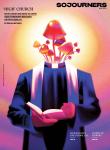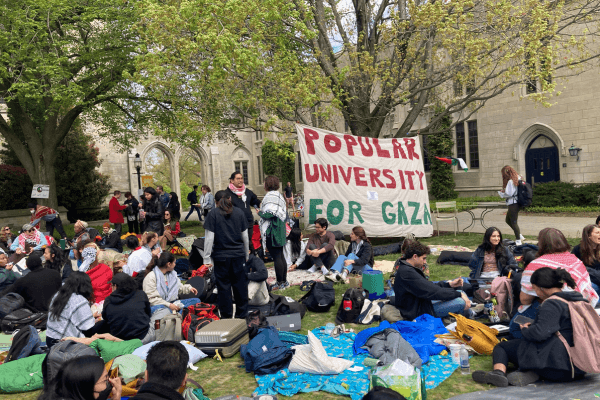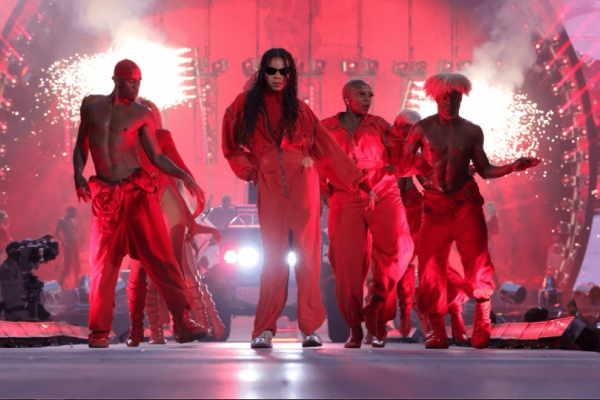Immigration is never out of sight for those whose lives depend on it, even while it may have not been a topic of choice for presidential and vice-presidential debates this year. Candidates and lawmakers on both sides of the aisle have used the stories and experiences of immigrant people for political gain. But for many immigrant people, engaging in the larger immigration discourse and advocacy work is primarily about our families and our communities: their present reality and their future opportunities. It is not about touting a “welcoming” nature or defending a seemingly attacked territory or national identity as politicians and others have often approached it.
For those of us who are deeply committed to our faith and to advocacy alongside our immigrant siblings this election season, we must ask: What is the extent of the beloved community? In too many election cycles, we have answered this question using the limitations of a world system that devalues people and their right to thrive.
The system we created
Dr. Oscar García-Johnson explains we have developed a world system that is independent from the world/cosmos God created and that is held up by two pillars: land and human value. This world system, he explains, mimics God’s identity. It uses the image of God as a tool to gain power over other human beings and to ultimately destroy the earth God created. In this world system, we have bifurcated the land and human value. We assign land to some and no land to others. People with land can choose to migrate but they are not forced to do so. They have sustenance and privilege. They have a basis to have hope for the future. People with no land are impoverished by this system., and they must find a means for survival. Migration is often the way for if they stay in their places of origin, they will be forced to engage in activities deemed dubious or criminal. These are the options to find hope for the future. Their lives are at risk.
García-Johnson says we do the same with human value, categorizing some lives as lives with value and others as lives with no value. Those to whom we assign value get to own land and, in a sense, they get to own others: their time and labor and their development processes. Those we deemed as having no value are reduced to numbers. As peripheral additions to the system, they are “the workforce.” Their lives are at risk. In God’s original world there were enough resources for all to live and thrive, and every person was made in God’s image with inherent value and dignity. Our world system is an affront to God’s intention for creation.
We risk killing our neighbors by ascribing no value to their lives and believing they have no right to sustenance. We make up normative categories like race and gender to further divide people with value and people with no value.
We must define the beloved community the way it was set up in God’s world, where human beings freely tended to what was available to them in the garden and enjoyed mutual relationships of trust. In our world today, God's vision means our neighbor is not the one proximate to us, but the one whose life is at risk.
Suppressing the votes of immigrant people
At risk in this election are the lives of those who are not allowed to participate in the electoral process either because their votes are suppressed or because they have no right to vote. Black, Indigenous, and communities of color are particularly affected by this. The removal of voting sites in communities of color, the excessive voter roll purges, and the disinformation campaigns are all part of rampant voter suppression efforts. Immigrant citizens experience voter suppression in unique ways. When a form of identification is required for voting, immigrant people may experience challenges with mismatched names on voter registration cards and their forms of identification, as name changes and errors in documenting unfamiliar names occur. Law enforcement presence at polling sites may deter immigrant citizens from voting, particularly if they live in households where some members are not documented.
This year, hundreds of thousands of aspiring U.S. citizens could have naturalized and become eligible to vote. But USCIS, the agency that manages this process, struggled to conduct interviews that would allow these individuals to naturalize due to the pandemic. Oath ceremony cancellations and tardy rescheduling are also preventing many from naturalizing and voting.
Some have the privilege of exercising their right to vote while others live with the consequences of decisions they did not make. Non-citizen immigrants fall in that latter category – they have no right to vote. But this has not always been the case. Until about the 1870s it was common in many states to allow non-citizens to vote, but that faded during the era of Jim Crow and the heightened nationalism caused by conflicts like World War I. By 1926 there were no longer any states where a non-citizen could vote in state elections.
Today, 11 municipalities in Maryland allow non-citizens to vote in local elections and San Francisco allows it for school board elections only. The Illegal Immigration Reform and Immigration Responsibility Act of 1996 outlawed non-citizen voting in federal elections but by that time no state allowed it. The change served mostly to deter states from changing their laws to allow non-citizen voting in the future.
Even though not every non-citizen immigrant person was allowed to vote, a look back into this history tells us that another system is possible; we can extend the bounds of community beyond those whom we typically include. This also allows us to question the frameworks of the world system in which some have value and land — and some don’t.
Our struggle in this and every election is against a world system that has excluded people from the power of decision-making because they are deemed people without value or land.
Nineteen days away from the last day to vote, we must continue to reject a world system that devalues and dehumanizes people; and we must declare immigrant lives have value and provide for them to have land.
Here are some of the changes we should consider this election that will signal that, indeed, immigrant lives have value and they are not just a means to political gain for our leaders:
- Keep families and communities together and thriving by providing permanent pathways for citizenship to Deferred Action for Childhood Arrivals (DACA) and Temporary Protected Status (TPS) recipients and their families.
- Prevent collaboration of local law enforcement with immigration agencies.
- End the criminalization of immigrants, mandatory detention, and cruel practices that harm immigrant people and expand the racialized and inequitable prison system. Seeking asylum is a right not a crime. Migration-related infractions should not be prosecuted with prisons and jails.
- Restore the right to seek protection from persecution in its many forms. Reevaluate the rules that are making asylum practically impossible to attain in the U.S. Reinstate average quotas for refugee resettlement.
- Repeal all forms of the Muslim ban, which promotes anti-Blackness and discrimination against certain immigrants.
Questioning the bounds of the beloved community will continue until we see these solutions become reality, and then we will have to ask: Who still does not have value and who does not yet have land?
Got something to say about what you're reading? We value your feedback!








